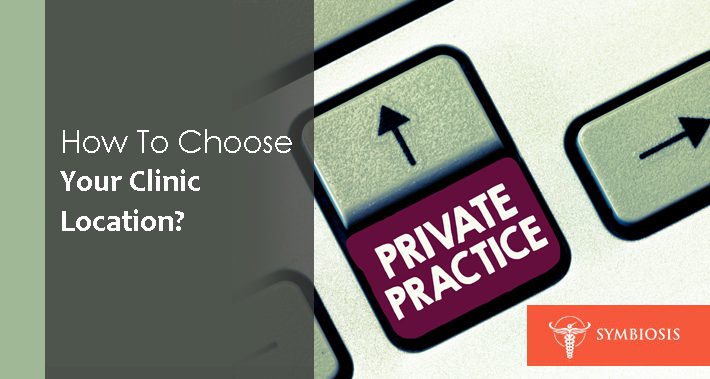
If you have decided to open a private medical practice there are many considerations to be aware of when searching for a location.
You want a space that works for your needs, and that makes a good first impression, both on the inside and out.
Studies show that 50 to 70% of patients consider location a key factor when choosing their medical practitioner.
Additionally, an article published by Forbes considers the location of your business a critical factor for success.
But you may not realize just how complicated finding the perfect location can be.
It’s not enough to just choose a clinic location that’s close to the local hospital or located in a populated area.
Larger group practices often spend a lot of money on area studies to find a suitable location.
Or, you might work with a commercial real estate agent who can allow you access to properties you may have otherwise missed, but this can also be costly.
RELATED: The Hidden Costs Of Building Your Own Private Healthcare Practice
At Symbiosis, our goal is to help you ease the burden of setting up your own practice while also helping you save money starting your own private practice.
In this article, we’ll share some of the key questions to ask yourself when searching for the ideal clinic location.
Important Questions To Consider
You can start by defining your needs and the needs of your patients.
Are you a general practitioner, or is your practice highly specialized?
RELATED: Is It Better To Start A General Or Specialist Private Practice?
Are you looking to base yourself in a dense urban setting, a suburban area, or a rural environment?
Below you’ll find some of the big questions you’ll need to consider when choosing your clinic location.
1. Is Your Clientele In The Neighborhood?
Several factors come into play when considering the neighborhood in which you want to set up your new practice.
You may consider your consultation fees when looking at an area and ask yourself whether your target clients reside there.
RELATED: How To Attract More Of Your Ideal Patients To Your Private Practice
Ultimately, the best option is often to seek to join the community and demographic that you cater to.
For example, a pediatric practice should search for a location where plenty of young families reside.
Alternatively, if you’re going for a younger, health conscious crowd, try finding a hip and upscale neighborhood.
At the same time, it’s also important to not shy away from areas that aren’t exactly in your target neighbourhood; you may have stumbled upon an underserved area.
2. Can Your Clientele Access The Neighborhood?
A 2004 study by Mark F Guagliardo stresses the importance of spatial accessibility when deciding on a practice location.
The ideal location allows for minimal commuting times, for both you and your clients.
Is the space easily accessible by public transit?
Are there good roads and sufficient parking spots for your older clients?
If you’re locating your new practice in a spot where patients will commute in from the city, are there major highways, bus, or train stations nearby?
One solution to these questions is to situate yourself within approximately 20 minutes of the neighborhood you wish to serve.
Elevators are especially important if your clinic is located on a higher floor of a building, particularly if you’re serving older patients or those with disabilities.
3. Are There Allied Practitioners Nearby?
If you have an area of specialty, you can aim to situate yourself close to other practices whose specialty complements yours.
This is a great opportunity to network with other healthcare providers.
Referrals by local practitioners will help you grow your client list.
If you specialize in treatments for chronic pain, for example, it might be a good idea to set up near a physical therapist, occupational therapist, or an acupuncturist.
When you fill a missing niche in the neighbourhood, you’re the straightforward choice for potential clients as well as for referrals from complementary specialties.
Being close to a hospital may look like competition, but it can be a blessing to your patients, who will have less far to travel for tests and referrals.
4. Are There Competing Practitioners Nearby?
It’s often useful to look to your competitors as potential allies rather than enemies.
For example, you may consider the rate of population growth in the surrounding area.
Areas of growth with practices that are bursting at the seams are often happy to have additional practitioners in the area.
But even beyond that, every healthcare provider has a certain area of practice they’re more interested in than others.
You can explore this by speaking to other healthcare providers like you in the area; it’s possible their area of interest just happens to be a field of medicine you’d rather avoid, or vice versa.
This makes you a perfect resource for referrals.
RELATED: How To Get More Patient Referrals In Your Private Practice
And even if they are directly competing for your ideal client, they might be gearing up to retire in the next few years, leaving you in a position to pick up the slack.
It’s important to do your research to find out not only who else is in the area, but what potential the area shows in the coming years.
5. How Visible Is Your Location?
Are you tired of skimping on rent by locating yourself on the outskirts of town?
If so, it might be useful to try and see the added costs of being in a space with prime visibility as a marketing investment.
It’s no good keeping the rent low when you have no clients coming through your door.
However, you’ll have to do more than just set up shop on a busy street if you want maximum visibility.
It’s often useful to examine the area in question, looking at it through the eyes of your patients.
Is the location easy to find, or will patients be unable to locate you, even if they spotted your online advertising?
Is the clinic in a “healthy” area, or is it sitting in the middle of fast food alley?
Does the exterior of the building seem welcoming to clients, or is it in a rundown area that no one will want to visit?
The look and feel of the neighborhood will make a statement about your quality of care, as patients will associate “clean” with “healthy”.
And of course, that’s only possible when you have a highly visible location.
6. What Are The Terms?
Once you’ve found the location of your choice and narrowed down a few spaces as the strongest contenders, it’s vital that you closely examine the terms of the lease or sublease.
This process will help you avoid the common mistakes clinicians make when leasing their practice office space.
The terms of a lease or sublease could greatly change the amount of time and money you spend on your clinic location.
Just as the outside of the building should be welcoming, the inside space is of equal if not greater importance to make that good first impression.
If you’re considering signing a new lease, see if the landlord is willing to offer a tenant improvement allowance, some money to help offset the renovation costs.
If you have the budget and the space needs work, ask what is the time frame for the renovations to be completed?
The ideal clinic space is designed to facilitate easy patient “flow” and is well maintained by the building owners.
Also, the terms of your lease or sublease should clearly state who is responsible for what.
It’s important to find out how much is included in the asking price, such as water, electricity, trash removal, or cleaning.
These considerations are just the tip of the iceberg and all of them are negotiable.
The time it takes to negotiate these considerations and the cost in the negotiation such as getting an attorney should be factored in when deciding on your new space.
Contact Symbiosis To Start Your Own Private Practice Today
Looking for a space for your future practice can be costly and time consuming.
If you are facing the decision of where to locate your clinic, why not get the experts involved?
We can help you take care of business so that you can take care of your patients.
Contact Symbiosis, and take your first step toward starting your own private practice today.
Symbiosis
1331 H St NW Ste 200,
Washington, DC 20005
(202) 794-6820
– https://goo.gl/maps/Xw6ezHdx53iDi8T98
Our Practice In A Box solutions take all the headaches out of opening and scaling your own private practice. We provide the clinic medical coworking space, operations, management, and more. Do what you do best – practice medicine – and leave the rest to us. From start to finish, we make sure your business is ready and thriving.
This is what makes Symbiosis the smarter choice.





